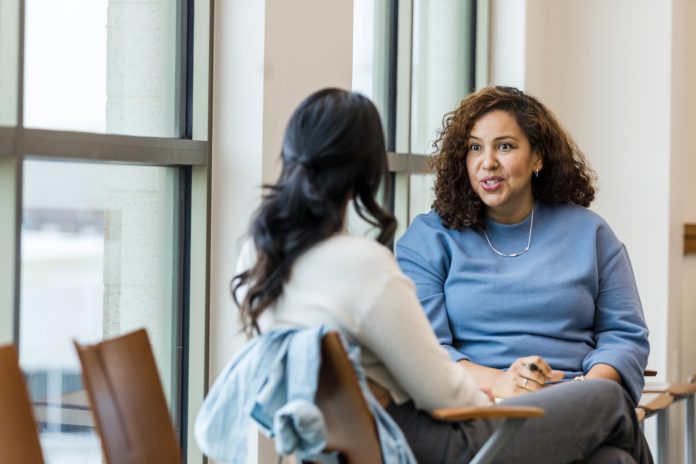Stigma around gynaecological health is perpetuating health inequities; we spoke to UK charity Wellbeing of Women about the impact of unmet needs in women’s healthcare and the strategies for change
Women face unique health challenges throughout their life course, from menstruation to menopause and beyond; women are managing complex and ‘messy’ bodies: blood, discharge, breastmilk, sweat, urine – the list goes on, which doesn’t begin to cover the profound psychological changes that can occur with hormone fluctuations.
On paper, it’s ludicrous to think this would come with any shame. Yet, reproductive and gynaecological health is deeply stigmatised and shrouded in silence. It’s impossible even to discuss the anatomy involved – vagina, vulva, clitoris, cervix – without disapproval and censorship. This is especially true for women from historically marginalised communities. Women from South-Asian communities have spoken of the lack of translation of anatomical terms or translations which are derogatory.
On paper, it’s ludicrous to think this would come with any shame. Yet, reproductive and gynaecological health is deeply stigmatised and shrouded in silence. It’s impossible even to discuss the anatomy involved – vagina, vulva, clitoris, cervix – without disapproval and censorship. This is especially true for women from historically marginalised communities. Women from South-Asian communities have spoken of the lack of translation of anatomical terms or translations which are derogatory.
‘Just a period’
Taking so-called ‘benign gynaecology’ as an example, the symptoms of heavy, painful periods can be debilitating. Women and girls report pain so severe that they miss school or work, bleeding so heavy that they can’t leave their toilets, and ending up in A&E because they’re desperate for help.
These symptoms are often a sign of underlying conditions like endometriosis, adenomyosis or fibroids, and treatments could help. Sadly, women are taught early on that their period-related symptoms are ‘normal’, that it’s ‘just a period’ or ‘just part of being a woman’. Too many women are encouraged to hide their period, mask their symptoms, and fear that no one will take them seriously. The latter is rationalised by the evidence – it takes an average of eight years for an endometriosis diagnosis, and a common topic in patient forums on period-related issues relates to medical gaslighting.
Even those who get help face long hospital waiting lists, invasive diagnostic tests, and a ‘test-and-learn’ treatment approach. Because of the silence, it’s likely that the true burden of gynaecological conditions is grossly underrepresented, so prioritisation of these conditions for research development and health-system improvement has been low.
A strategy for change
Despite a bleak gender health gap, the past few years have seen leaps forward in women’s health. A significant driving force has been the rise of social media as a platform to tackle taboos and overcome stigma. Celebrities are increasingly cause-driven on their channels, young people are airing their ‘embarrassing’ symptoms, and medical specialists can broadcast to mass audiences.
Picking up on this momentum, the Women’s Health Strategy for England has laid out a ten-year action plan for improving the health of women everywhere and appointed the first-ever Women’s Health Ambassador for England, Professor Dame Lesley Regan. One of the key actions in the plan is investment in Women’s Health Hubs, a cash injection for the setup of a one-stop-shop care pathway per integrated care board in England.
Professor Regan also sits as Chair of Wellbeing of Women and has been instrumental in developing our five-year strategy.
A future where women aren’t held back by their gynaecological health
At Wellbeing of Women, we’ve been innovating breakthroughs in women’s health for more than 60 years and are the only UK charity that spans all of women’s reproductive and gynaecological health. We’re working towards a world where women’s lives and choices aren’t limited by their gynaecological and reproductive health. Led by women’s voices,
we have three strategic pillars: research, education, and advocacy.
Our research is pioneering major advances in care, our information is giving women and girls the knowledge they need, and our campaigns are driving change where it is desperately needed.
Since the launch of our strategy, we’ve already had a significant impact. Our Menopause Workplace Pledge is transforming how employers support colleagues during this time in their lives. Alongside our Let’s#ChatMenopause campaign, we are normalising conversations, reaching millions of people and driving positive change.
Our latest campaign, ‘Just a Period,’ is tackling the dismissal of period-related symptoms and seeking to empower women and girls with information on when and how to seek help. We’re calling for menstrual health to be prioritised, shame, stigma and silence surrounding periods to end, supportive workplace policies and for young women to become their own menstrual health advocates.
Crucially, by encouraging young women to engage in health-seeking behaviour early and by taking their issues seriously, we create a generational change in attitudes to gynaecological health and start a positive journey throughout their lives.
Wellbeing of Women
www.wellbeingofwomen.org.uk
Twitter
LinekdIn
Facebook











